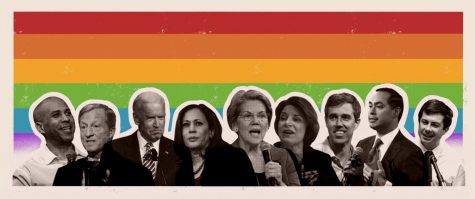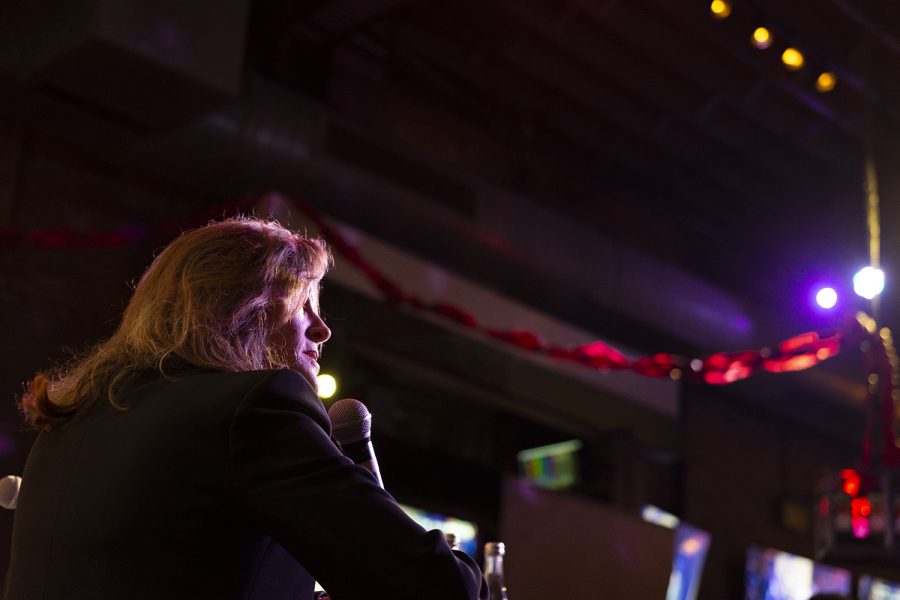Presidential candidates talk LGBTQ+ youth, healthcare and protests at historic town hall
October 11, 2019

On the eve of the 31st anniversary of National Coming Out Day, and two days after the Supreme Court heard arguments regarding LGBTQ+ workers’ rights, nine Democratic presidential candidates gathered in Los Angeles for the first-ever town hall focusing on LGBTQ+ issues aired on a major network.
Co-hosted by CNN and the Human Rights Campaign, the nine candidates who participated were: Sen. Cory Booker (D-N.J.); former Vice President Joe Biden; South Bend, Indiana, Mayor Pete Buttigieg; Sen. Elizabeth Warren (D-Mass.); Sen. Kamala Harris (D-Calif.); former Rep. Beto O’Rourke (D-Texas); Sen. Amy Klobuchar (D-Minn.); former Housing and Urban Development Secretary Julián Castro; and businessman Tom Steyer.
The town hall primarily consisted of questions from members of the audience who were LGBTQ+ or allies of the community. Each candidate was given 30 minutes to address various topics relating to some of the issues facing, and in some cases threatening, LGBTQ+ Americans today.
The Chronicle has broken down some of the standout discussion topics:
Protesters
At three distinct points throughout the four and a half hours of the town hall, protesters interrupted the goings-on to bring attention to trans women of color.
The first was during Buttigieg’s time. Before he had even spoken, protesters holding a transgender flag marched down the aisle, chanting, “Trans people are dying.” Once they had been quieted, CNN anchor and town hall moderator Anderson Cooper said that protest has been a part of the LGBTQ+ community for a long time, and Buttigieg agreed.
“I do want to acknowledge what these demonstrators were speaking about, which is the epidemic of violence against black trans women in this country right now,” Buttigieg said. “And I believe or would like to believe that everybody here is committed to ending that epidemic, and that does include lifting up its visibility and speaking to it.”
At one point, Harris was interrupted by a member of the audience who shouted, “How do we get those men to stop killing us? How do we get those men to stop killing trans women of color? We are hunted. Systematically hunted. How can they do that?”
Harris responded by saying that there must be “serious consequence and accountability” for acts of violence against transgender people of color, and she cited her record as proof that she could do this, pointing to both her time as San Francisco district attorney when she established a hate crimes unit and her time as California attorney general when she pressed to abolish “gay panic” and “transgender panic” defenses in criminal trials.
The final and most visible interruption of the town hall was by a black transgender woman who self-identified as Blossom C. Brown. Brown intervened when another audience member was about to ask a question and grabbed the microphone to vocalize her anger with the fact that not a single black transgender man or woman had asked a question throughout the town hall thus far.
“CNN, you have erased black trans women for the last time,” Brown said.
Equality Act and LGBTQ+ Rights
Every participating candidate agreed that the Equality Act would be a priority for them as president.
The Equality Act is a bill that would protect LGBTQ+ Americans from discrimination in employment, housing and all other private and public services, regardless of religious exemption. In light of the recent arguments made before the Supreme Court about employment rights of the LGBTQ+ community, the Equality Act would ensure the community’s protection no matter what.
Buttigieg said he would sign the bill “the moment it hit his desk,” and Biden said that it would come “first and foremost.” Booker, one of the original sponsors of the Equality Act, also stressed its importance, though he dodged giving a direct answer on whether or not religious institutions should lose their tax-exempt status if they oppose LGBTQ+ rights.
Tax exemption came up several times throughout the night, with O’Rourke in particular taking a strong stance on the matter.
“There can be no reward, no benefit, no tax break for anyone or any institution, any organization in American that denies the full human rights or the full civil rights of every single one of us,” he said.
Many candidates also committed to ensuring that violence against LGBTQ+ people would be treated as hate crimes, and Biden and Castro went so far as to outline provisions that would make aid to foreign countries contingent on their respect of LGBTQ+ rights.
HIV/AIDS and Blood Donations
A hot-button topic for the evening was the decriminalization of HIV. In some states it is still illegal to not disclose HIV status to sexual partners. Many candidates argued that HIV that has been treated to the point of being undetectable and therefore cannot be transmitted to others should be decriminalized.
Buttigieg called for the decriminalization of HIV, as well as for the Food and Drug Administration to change its blood donation policy that prohibits cisgender men who have had sex with another cisgender man within a year from donating.
“When I’m president,” he said, “I will direct the FDA to revise the rules based on evidence, based on individual risk factors, and without regard to the prejudice that has driven the current policy.”
Harris also said that she would ensure that HIV and AIDS were eliminated within a generation, particularly focusing on the way black LGBTQ+ people are disproportionately affected.
LBGTQ+ Youth
Two talking points that arose around LGBTQ+ youth included homelessness and comprehensive gender and sexuality education.
Warren said she would make a program specifically dedicated to LGBTQ+ people in the U.S. Interagency Council on Homelessness, and expressed her support for age-appropriate LGBTQ+ sex education in public schools.
Harris said that LGBTQ+ youth homelessness is “one of the biggest issues that we are not talking enough about.” She pointed to her proposed Rent Relief Act, which would provide a tax credit for people who spend 30% or more of their income on rent and utilities as a potential way to ease this crisis.








